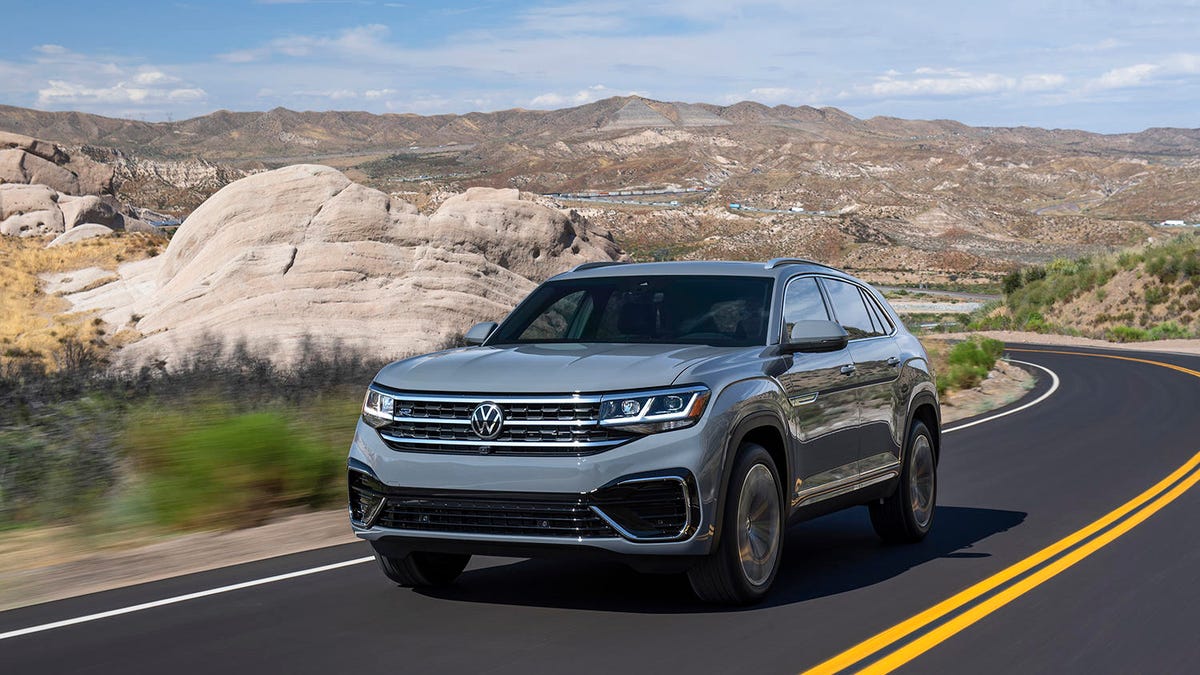2020 VW Atlas Cross Sport makes few sacrifices for the sake of style
The five-seat version of the Atlas SUV gets a shorter body and a coupe-like roofline
Even if Volkswagen hadn't already explicitly said it was building one, it was inevitable that the brand would jump on the coupeover bandwagon. It's doing so with the new Atlas Cross Sport, revealed Friday, which is essentially a regular Atlas with a sloping roof and only two rows of seats. The looks of the Atlas Cross Sport are also no surprise, as it was directly previewed by the concept of the same name from the 2018 New York Auto Show .
The Cross Sport is 2.8 inches shorter and 2.3 inches lower than the regular Atlas, but it rides on the same wheelbase. Despite the reduced length and raked rear hatch, the Cross Sport doesn't lose much in terms of practicality. The Cross Sport's 40.3 cubic feet of luggage space behind the rear seats is shy of the standard Atlas' 55.5 cubic feet, but a good deal better than the 20.6 cubic feet that the three-row Atlas has with all seats up. The Cross Sport's rear seat bests the bigger Atlas' second-row legroom by 2.8 inches, although VW doesn't say whether the bench slides or reclines.
Beyond the shorter body and raked rear glass, there are some notable styling differences from the full-size Atlas, almost all of which I expect to make their way to the the regular Atlas when a facelift inevitably comes about. There is a new three-bar chrome grille, headlights with a unique light signature, front and rear bumpers with different designs, the hood is more sculpted, the taillights are new, and the Cross Sport gets additional chrome exterior trim. An R-Line package adds more aggressive looks and additional piano-black and chrome exterior trim. Wheels as large as 21 inches are available.
New bits of design on the inside include a different steering wheel and some available accent stitching for the seats and door panels. There are some new convenience features like wireless charging, and the Cross Sport comes with niceties such as heated and ventilated seats, a digital gauge cluster and a 12-speaker Fender audio system. Eight trim levels basically match those of the three-row Atlas, ranging from base S to top-of-the-line SEL Premium. The bigger news is VW's updated Car-Net suite of tech features, which we recently got to experience first-hand.
Not a bad place to spend time, it seems.
The Car-Net hub, a new phone app, lets you remotely lock and unlock the doors, honk the horn, flash the lights and start the car. The app will also show the location of the parked car, as well as status info such as the fuel level, and schedule dealer visits. On navigation-equipped cars, you can also send destinations to the car from the app. These main services are free for the first five years of ownership. Coming later this year will be smart home connectivity for devices equipped with voice assistants like Amazon Alexa. Car-Net also includes a wireless hotspot that provides 4G LTE internet for up to four devices.
Like the regular Atlas, the Cross Sport will be available with either a 235-horsepower, turbocharged, four-cylinder engine or a 276-hp, naturally aspirated V6; both engines use an eight-speed automatic transmission. Front-wheel drive is standard while 4Motion all-wheel drive is an option. A towing package for the V6 allows for a 5,000-pound tow rating, matching the bigger, V6-powered Atlas. The Cross Sport should be lighter and slightly quicker than the three-row Atlas, although not by much, and reviews editor Emme Hall said as much when she drove a prototype earlier this year.
Two new active-safety features debuting (for the US, at least) on the Cross Sport are Dynamic Road Sign Display and Traffic Jam Assist. The former is pretty self-explanatory: When equipped with navigation, the Cross Sport will use the front-facing camera and nav data to display road-sign info on the gauge cluster and infotainment screens. Traffic Jam Assist works with the adaptive cruise control and lane-keeping assist from 0 to 37 mph, maintaining a following distance from the car in front and keeping the Cross Sport centered in the lane. This system can restart from a stop up to 3 seconds long. If the car is stopped for longer, you'll have to resume it yourself. A host of driver-assist features including automated emergency braking, rear cross-traffic alert and blind-spot monitoring are standard on all trims. Adaptive cruise control and parking assist come with higher trim levels.
The Cross Sport will be built at the same Chattanooga, Tennessee, plant as the three-row Atlas and the Passat . VW says the Cross Sport is part of a $340-million investment in the plant, and an additional $800-million investment will be made for the production of future electric vehicles. Pricing for the Cross Sport has yet to be announced, but expect a starting price pretty close to the standard Atlas' $31,890 base figure. The 2020 Atlas Cross Sport will go on sale next year.


